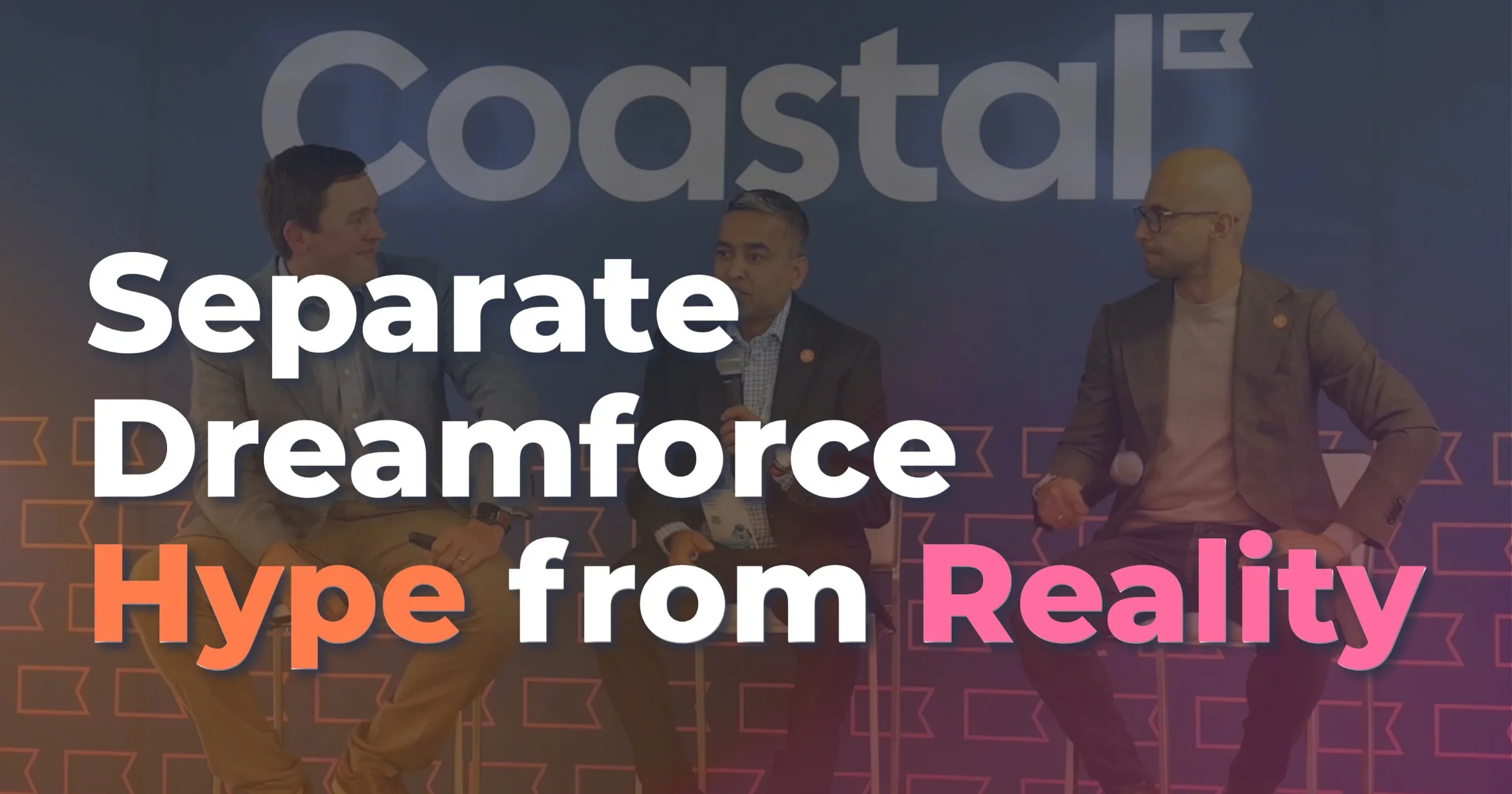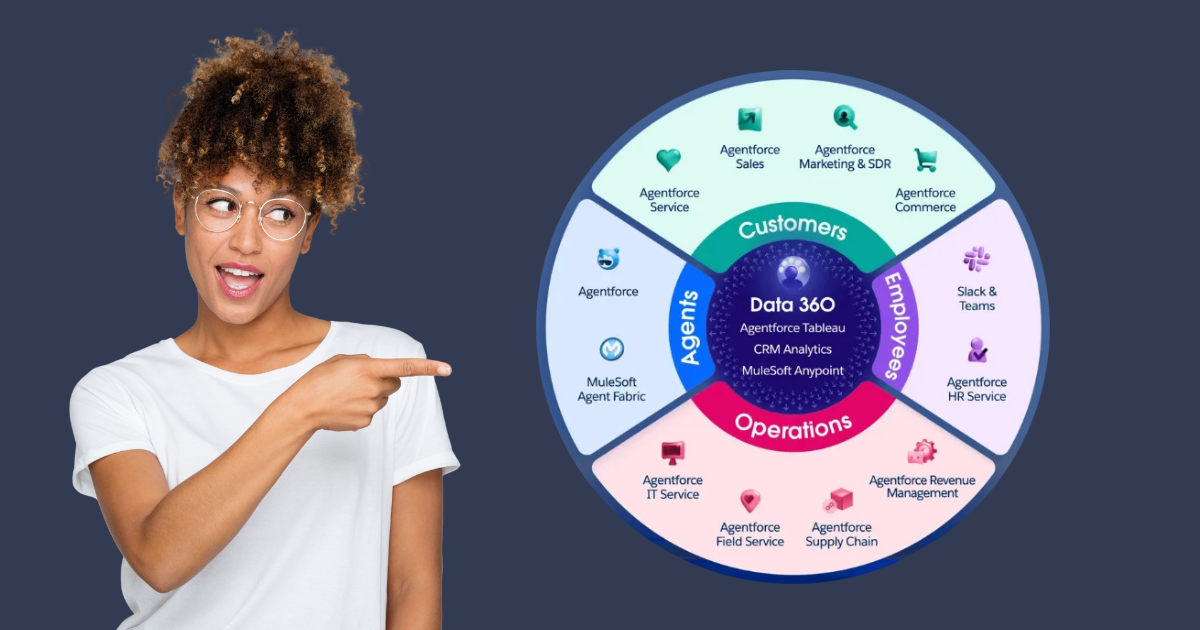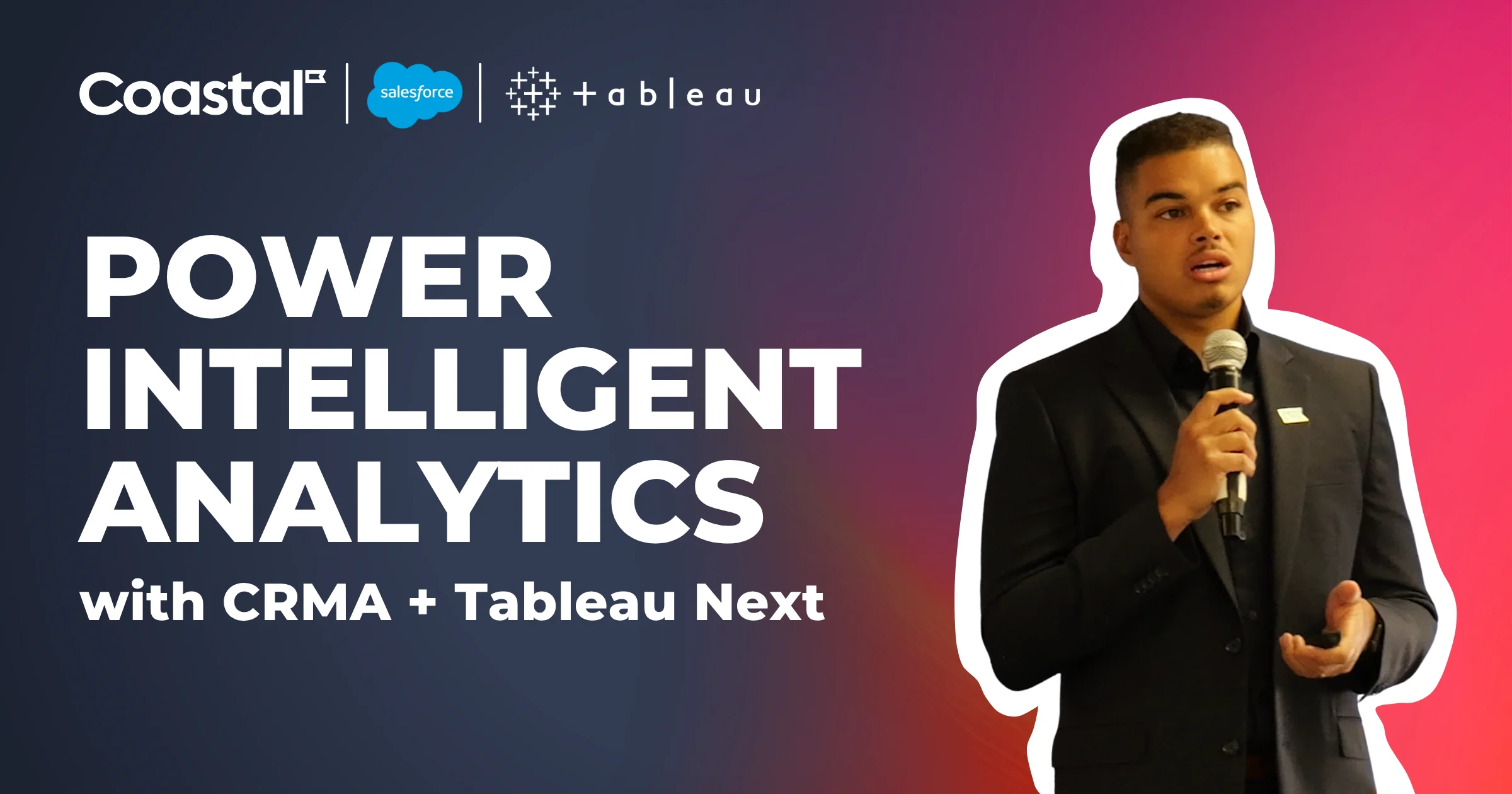Short on time? Skip to the TL;DR
Choosing a Salesforce partner matters because the implementation decisions you make now will define how well the platform supports your business for years.
Get it right, and you’ll have a system that scales, drives adoption, and sets you up for AI readiness. Get it wrong, and you’ll face delays, low user trust, and sunk license costs.
This guide breaks down the traits we see in top-performing Salesforce consulting partners—and the questions that reveal whether you’ve found one.
What You’re Actually Hiring
You’re not hiring a team to “install Salesforce.” You’re hiring a team to understand how your business actually operates—revenue flows, service models, approval bottlenecks—and design Salesforce in a way that supports growth without breaking six months later.
That’s how we approach every engagement at Coastal: starting with business clarity, then using a structured approach that keeps projects on track and decisions clear. With over 7,000 projects delivered as a Salesforce Summit Partner—the highest tier in Salesforce’s ecosystem—we’ve seen firsthand how early choices shape long-term success.
5 Traits That Separate Top-Performing Salesforce Partners
1. They design Salesforce as part of the system, not the system itself
Salesforce doesn’t run in isolation. Your customer data lives in Snowflake, Databricks, or BigQuery. Your analytics may run through Tableau. Your operations hinge on ERP workflows. Strong partners design Salesforce as part of that broader ecosystem, not as a standalone app. That’s why Coastal’s teams include architects who think in systems, not just features.
2. They put strategy before accelerators
Accelerators can create speed and consistency, but they aren’t always the right choice. The best partners bring the experience to know when an accelerator adds value and when a tailored approach is smarter. That judgment only comes from years of applying both. At Coastal, strategy and clarity always come first—accelerators follow only if they move the solution forward.
3. They plan for what comes after go-live
Getting to launch matters, but it’s just the beginning. The real test comes once sales teams rely on the system daily, executives depend on accurate reporting, and service leaders look for performance gains. That’s why Coastal plans for ongoing improvements and provides the change management training and support teams need to keep momentum—so adoption builds with confidence.
4. They know your industry already
Every sector has its own rules, risks, and processes. A partner who understands those dynamics can move faster and avoid costly detours. That’s why Coastal invests in industry-certified teams across Salesforce’s vertical Clouds, from Health and Financial Services to Public Sector and Manufacturing. Whether it’s HIPAA compliance, grants eligibility, financial risk frameworks, or speeding up quoting for SaaS providers, experience in your industry shortens the learning curve and speeds up results.
5. They deliver results through a clear roadmap
Configuring features isn’t the hard part. The real value comes from knowing what to build first, and how it ties to business goals. That’s why Coastal builds a prioritized roadmap for every engagement—so each milestone leads to a result the business can see and use. It’s how we make sure leadership priorities show up in what actually gets built.
The Right Fit in a Salesforce Consulting Partner
The right partner understands your business quickly and turns that knowledge into clear design decisions. Working sessions run efficiently, with visible progress from one meeting to the next.
At go-live, teams have what they need to do their work, and adoption gains traction as they see the system supporting them. Leaders can measure value in real terms, and the partner provides a roadmap for continued evolution.
That’s the hallmark of a strong fit: steady momentum, tangible outcomes, and a platform designed to grow with the business.
What to Do If You’re Not Sure Yet
If you’re evaluating consulting partners and need to cut through the pitch decks, start here:
- Ask how they design for broader system architecture. Can they speak fluently about your data layer, integrations, and ERP stack?
- Ask how they balance advisory and implementation. Can they show examples of projects where strategy shaped the build?
- Ask what their support model looks like after launch. Do they help your Salesforce org keep evolving—or do they just respond to tickets?
- Ask what success looks like one year after go-live. Their answer will tell you everything about their priorities.
- Ask how they think about AI enablement. The right partner will show you how today’s data and workflow decisions set you up for Agentforce, Tableau Next, and Data Cloud tomorrow.
One More Thing: Get a Second Set of Eyes
If you’re still defining what “good” should look like, Coastal offers a complimentary Salesforce Diagnostic.
In less than a week—and with minimal time from your team—you’ll get a focused health check of your Salesforce environment with customized, actionable recommendations to make Salesforce work harder for you.
The deliverable includes:
- A system health report covering usage, security, automations, and performance
- Strategic recommendations based on Coastal’s 20+ years of Salesforce expertise
- A prioritization plan using our True North method, showing what to tackle first for impact
It’s a practical way to see where your Salesforce setup is strong, where it’s leaving value on the table, and how to prepare your org for AI readiness.
Button: Request a Diagnostic
TL;DR: Choosing the Right Salesforce Implementation Partner
Q: Why does choosing the right Salesforce partner matter?
A: Because succeeding with Salesforce depends on how it’s implemented, not just the software itself. The right partner makes it a platform that supports adoption and delivers results. The wrong one leaves you with delays, low user trust, and sunk costs.
Q: What am I really hiring a Salesforce partner to do?
A: More than just “install Salesforce.” A top partner learns how your business operates—your revenue flows, service models, and bottlenecks—and designs Salesforce to scale with you. At Coastal, that means starting with business clarity and using a structured approach that keeps projects on track.
Q: What traits separate the best Salesforce implementation partners?
A:
- They design Salesforce as part of the system, not the system itself.
- They put strategy before accelerators.
- They plan for what comes after go-live.
- They know your industry already.
- They deliver results through a clear roadmap.
Q: How will I know I’ve found the right fit?
A: Collaboration feels productive, not performative. Your teams can see progress from one meeting to the next. At go-live, people use the system, adoption grows naturally, and leadership can measure value without chasing it.
Q: What should I ask when evaluating partners?
A: Ask how they:
- Design Salesforce to fit your data, analytics, and ERP stack.
- Balance advisory with hands-on implementation.
- Support you after launch (optimization vs. ticket response).
- Define success one year post–go-live.
- Think about AI readiness and prepare you for Tableau Next, Data Cloud, and Agentforce.
Q: What if I’m not sure whether my current setup is working?
A: Coastal offers a complimentary Salesforce Peak Performance Diagnostic—a health check that delivers a system report, strategic recommendations, and a prioritized roadmap of what to fix first. It’s a practical way to see where Salesforce is strong, where it’s leaving value on the table, and how to prepare for AI.



